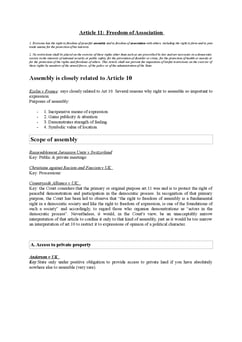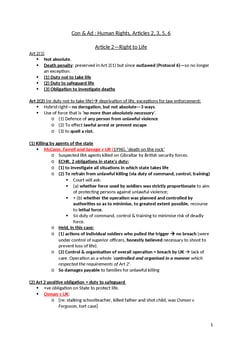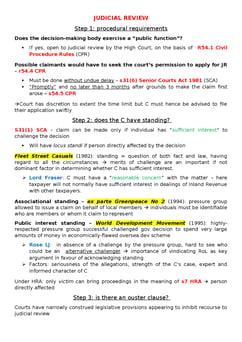Regina v British Broadcasting Corporation ex parte [2003] 2 All ER 977
Judgement for the case Regina v British Broadcasting Corporation ex parte
Table Of Contents
-
The BBC, under legislation, has certain standards of non-offensiveness, etc. and a party who were entitled to an election broadcast submitted a video that would have breached these standards.
Therefore the BBC decided not to allow it to be shown.
The claimants said that the BBC had curtailed their freedom of expression under Article 10.
HL
Said that there were reasonable grounds for the BBC to remove the video: it was not discriminatory or arbitrary, since all parties were subject to the same restrictions.
The BBC were simply applying the laws set out by parliament, which were not in contravention of Article 10.
Lord Hoffman (with majority)
-
Article 10 is freedom not to be prevented from expressing oneself by interference from public authorities.
This does not extend to right to use television channels.
Their usage is required by parliament subject to the ordinary conditions under which the BBC operates i.e. with concern for taste and decency.
He basically says that use of election broadcasts is a statute-created privilege, which is subject to the requirements of the BBC. It does NOT constitute part of the Article 10 right (This is true: though perhaps it was a bad decision by the BBC not to allow the broadcast, it was nevertheless within their power to do so.)
He also says that it is proper for the courts to recognise that parliament is the right body for deciding the standards of TV broadcasting and because of the doctrine of “deference” the courts should accept this.
NB Hoffman
Does NOT like the word “deference” and says it is really about deciding the whether a question is a matter for the courts or for parliament i.e. determining the competence area of each institution.
Lord Scott (dissenting)
-
Article 10 IS engaged.
His reason for arguing this is that licenses are required for TV and radio and are only granted subject to certain restrictions on what can be shown. He says it follows from this that Article 10 is engaged. Why? This makes no sense!
Perhaps he is arguing that for Parliament to limit what broadcasters can show would be to limit their freedom of expression, and by extension to impose limits on what else can be shown would be to limit the freedom of those who are broadcasting.
However, as Hoffman says, there is no right to broadcast TV, and the fact that licenses are required proves this.
He then goes on to talk about how Article 10 is being curtailed in a way that is unnecessary, etc.
For Further Study on Regina v British Broadcasting Corporation ex parte

European Human Rights law notes fully updated for recent exams at Oxfor...
Need instant answers? Our AI exam tutor is here to help.
Ask questions 🙋 Get answers 📔 It's simple 👁️👄👁️
Our AI is educated by the highest scoring students across all subjects and schools. Join hundreds of your peers today.
Get StartedSimilar Cases
Related Product Samples
These product samples contain the same concepts we cover in this case.
| GDL Constitutional and Administrative Law | Echr Art 10 Notes (19 pages) |
| European Human Rights Law | Freedom Of Expression Notes (9 pages) |


 Since 2010, Oxbridge Notes has been a trusted education marketplace, supplying high-quality materials from top achievers at universities like Oxford, Cambridge, LSE, Harvard, and Yale.
Since 2010, Oxbridge Notes has been a trusted education marketplace, supplying high-quality materials from top achievers at universities like Oxford, Cambridge, LSE, Harvard, and Yale.